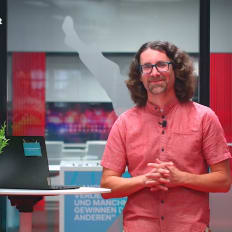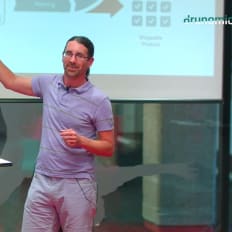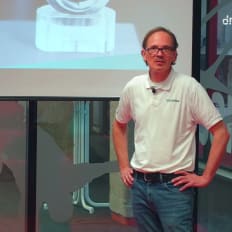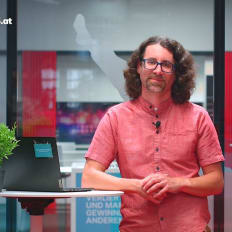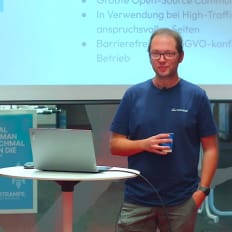
drunomics GmbH
Sinduri Guntupalli, Product Manager bei drunomics
Description
Sinduri Guntupalli von drunomics spricht im Interview über ihren technischen Background und das Besondere an der Arbeit mit Drupal.
By playing the video, you agree to data transfer to YouTube and acknowledge the privacy policy.
Video Summary
In "Sinduri Guntupalli, Product Manager bei drunomics," Speaker Sinduri Guntupalli traces her path from civil/environmental engineering to coding in Vienna (Python then PHP), landing a Drupal role via LinkedIn at Jobico and building 5+ years of Drupal experience. Now a product manager, she oversees the Mospo cloud CMS ecosystem—planning, developer management, QA, client requirements, and documentation—while volunteering across Drupal events and serving as marketing manager for Drupal Austria, emphasizing open-source culture and support for community events. Key takeaways: a technical foundation strengthens product management, continuous learning with a “let me figure it out” mindset (and an active LinkedIn profile) opens opportunities, and contributing to open source builds skills and impact.
From Civil Engineering to Product at drunomics: How Sinduri Guntupalli built a Drupal-powered career through continuous learning and community
Why this story matters
Watching “Sinduri Guntupalli, Product Manager at drunomics,” one theme kept surfacing for us: reinvention through deliberate steps. Sinduri’s journey runs from a Bachelor’s in Civil Engineering in India to a Master’s in Environmental Engineering in the U.S., and then to Vienna in 2017—where her tech story truly began. What followed was a series of practical experiments (a short Python course), committed learning (a full-stack PHP program), and a set of choices anchored in open source, community, and impact.
We heard a narrative where curiosity meets structure: try, then commit; learn, then give back. The result is a career that blends engineering instincts with product leadership and community contribution. It’s a story of momentum—powered by Drupal and the people who build with it.
The move to Vienna and the spark that made coding “click”
Sinduri frames her switch to tech with refreshing candor. She had long wanted to become a developer but hadn’t made the leap because she wasn’t sure what exactly she wanted. Moving to Vienna changed that. Interestingly, language learning played a catalytic role:
“After I came to Vienna, and honestly after doing a few German courses, learning to code seemed much more easier.”
So she ran a small experiment: a short Python course, to see whether programming genuinely resonated.
“I absolutely loved it.”
That confidence fuelled the next step: a full-stack development course focused on PHP. This wasn’t random; it was a crafted on-ramp from interest to sustained practice.
Finding a home in Drupal
Sinduri has worked with Drupal for more than five years now. She lays out what makes the free, open-source CMS compelling: it handles a wide range—from simple blogs to complex, enterprise-grade websites—and is preferred by organizations across public, media, and education sectors because it is secure, scalable, and able to support complex requirements.
Equally important is the culture that sustains it:
“What’s really special about Drupal is its strong community, where everybody comes together to build something good and continuously improve the platform.”
That community didn’t just frame her understanding of the tech—it directly shaped her career. A mentor, Drupal veteran Klaus Buehler, found her on LinkedIn. Her note here doubles as advice:
“Yes, LinkedIn works, so always have your profile active.”
He interviewed her for a Configuration Manager role at Jobico. The job called for integrating third-party APIs and doing back-end development. The twist: she was given a Drupal test despite not knowing Drupal yet. She passed—and got the role. She stayed for two and a half years and became, in her words, “hooked on Drupal and its community.”
Why drunomics: choosing open source on purpose
When layoffs hit her previous company, she faced a fork in the road: keep building outside open source or try something new. The offer from drunomics GmbH aligned perfectly with what motivated her.
“When drunomics offered me the product manager role, I was immediately drawn to their commitment to Drupal and their contributions to the open-source communities.”
She describes drunomics as a web development agency established in 2012 with offices in Vienna and Linz, a team of experts in open-source technologies, Drupal, and Nuxt—building award-winning enterprise websites while consistently giving back to the community. That reciprocity is not an add-on; it’s part of the company’s core values.
The work: product cycles, cloud CMS, and dependable delivery
In her day-to-day, Sinduri focuses on the cloud CMS ecosystem “Mospo” and the projects connected to it. Her remit is wide and hands-on:
- Oversee product development cycles
- Manage developers
- Carry out QA testing to ensure reliability
- Connect with clients, gather requirements, and provide updates
- Own documentation and promote cross-team collaboration
It’s a version of product management that treats quality as integral and technical understanding as a driver of clarity rather than a gatekeeping device.
Why a technical background is a force multiplier in product
Sinduri distills a truth many teams learn the hard way: technical fluency inside product makes everything more honest—timelines, trade-offs, definitions of done.
“It helps in understanding how developers work and what helps them to succeed. My technical background helps me in setting realistic timelines, creating clear communication between stakeholders and developers, and also ensures the product and the project always meets the business goals and is set up for good technical standards.”
She’s also candid about what she misses:
“Every day, I miss the immediate satisfaction of writing clean code and debugging complex problems, but I feel the switch has been rewarding.”
The reward is tangible when her team respects her understanding of the product and feels valued. That’s product leadership as enablement: ensuring the people building the product are set up to succeed.
A simple principle: continuous learning
If there’s a signature line in this talk, it’s this:
“I have never said, no, I do not know this and I won’t be able to do it. I have always started with, let me figure it out.”
This ethos anchors how she approaches outcomes, impact, and team growth. She’s results-oriented and finds joy when projects deliver visible impact. And she believes in creating a collaborative environment where everyone can grow—both professionally and personally.
Volunteering and community: from DevDesk to Drupal Austria
Community work isn’t a side note for Sinduri—it’s a flywheel. Encouraged by her mentor Klausi, she volunteered at Drupal DevDesk Vienna in 2023. She enjoyed the whole process and the time spent with the community. That first yes led to more yeses.
In the last year, she supported three events:
- Drupal Mountain Camp Switzerland
- Drupal DevDesk Bulgaria
- Drupal Camp Berlin
She was also elected marketing manager for Drupal Austria. These are the kinds of roles that create surface area for others to connect, learn, and contribute—and for ideas to become initiatives.
How drunomics supports open source—systematically
Sinduri is explicit about the company’s stance:
- drunomics provides both dedicated time and financial support for employees who want to contribute to Drupal
- The company actively sponsors Drupal conferences and camps
- Employees are encouraged to organize events and present sessions
“They’re all about knowledge-sharing, gaining knowledge, giving back knowledge, and also to the open-source community.”
She sums up why this matters:
“Drupal wouldn’t exist without people contributing their code, energy, and ideas, and these community events help people come to a common space to make that collaboration happen.”
Why we contribute: meaning, growth, and beginnings
At a workshop during Drupal Mountain Camp, organized by Mikko Hamelien (CEO of Druid), participants discussed their motivations for contributing. Different backgrounds, similar conclusion:
“We all wanted to contribute to something meaningful while growing personally in the process.”
For Sinduri, Drupal events are not just networking. They surface ideas, they start things. They make the community better than it was before—not as a slogan, but through real conversations and code.
Open-source communities like Drupal are, in her words, effective models for collaboration: people contribute not because of hierarchies but because of passion and expertise. And the skills developed along the way—communication, collaboration, mentorship, problem-solving—spill over into everyday life.
She closes with a goal that captures her approach, even adding a line in German:
“My goal is to support the Drupal community, bring together teams from different sectors, … und neue Bekannte und erfahrene Menschen und die Positivität in der Gemeinschaft verbreiten.”
What engineers and product folks can do next
The talk surfaced a set of actionable patterns we believe are relevant across roles:
- Start small, then commit: A short, focused course (for her, Python) is a low-risk reality check. If it clicks, scale your learning (as she did with a full-stack PHP program).
- Keep your profile alive: Visibility creates luck. Her mentor found her on LinkedIn—it’s a pragmatic channel for serendipity.
- Say yes to tests: Being assessed in a technology you don’t yet know is an opportunity, not an indictment. “Let me figure it out” is an asset.
- Bring technical depth into product: It’s easier to set realistic timelines, make trade-offs explicit, and protect quality when you understand how the system actually works.
- Miss coding, but embrace product impact: It’s okay to miss the rush of debugging. But there’s deep satisfaction in empowering teams and shipping reliable, valuable outcomes.
- Volunteer to unlock momentum: One event leads to three, then to a formal role. Community work compounds.
- Choose open-source-positive employers: Sponsorship, contribution time, and encouragement to speak or organize are signals that a company doesn’t just use open source—it sustains it.
- Learn in public: Sharing knowledge forces clarity and invites feedback. Talks, docs, and contributions accelerate growth.
Product that respects engineering
We appreciated how Sinduri describes the day-to-day practice of product: translating business goals into actionable plans while maintaining technical standards. That shows up in the kinds of questions product should own together with engineering:
- What dependencies and risks should we surface early?
- How do we test reliability—not just functionality—through the cycle?
- What definition of done protects maintainability and performance, not only features?
The fact that she explicitly calls out QA as part of her responsibility signals a broader view: quality isn’t a tail-end activity; it’s embedded in the lifecycle. That posture builds trust—with developers, stakeholders, and customers.
Open source as a platform for careers
Sinduri’s path illustrates how open source accelerates individual growth while strengthening the collective. The mechanisms are simple and powerful:
- Visibility: Contributions, talks, and organizing make your work and values visible.
- Network: Mentors, peers, companies—communities connect people who give each other chances.
- Impact: You can see how ideas and work shape real products and practices.
Drupal’s culture of reciprocity—take and give, learn and teach—amplifies these effects. It becomes a place where careers are built in public, with others.
Conclusion: Careers as community projects
“Sinduri Guntupalli, Product Manager at drunomics” is a story about courage, curiosity, and contribution. It shows how small tests prepare big shifts; how technical fluency makes product more honest and humane; and how community turns opportunities into momentum.
For us, the line that best captures the arc is simple and strong: “Let me figure it out.” That mindset builds not just products, but bridges—between functions, teams, and communities. And along those bridges, people grow, software improves, and open source stays exactly what made Sinduri’s journey possible: a commons powered by code, energy, and ideas.
More Tech Talks
drunomics GmbH Security- und Risiko-Management
Jeremy Chinquist von drunomics erzählt in seinem devjobs.at Interview darüber, wie das Unternehmen mit Security- und Risiko-Management umgeht und welche Standards eingehalten werden.
Watch nowdrunomics GmbH Agile Development at drunomics
Jeremy Chinquist von drunomics spricht in seinem TechTalk über die Grundgedanken der agilen Entwicklungsmethode, welche beim Developer Team im Unternehmen zum Einsatz kommt.
Watch nowdrunomics GmbH Professionelle Web Entwicklung aus Österreich
Oliver Berndt von drunomics zeigt in seinem devjobs.at TechTalk die Kernkompetenzen von dem Unternehmen und wie sie mit Drupal arbeiten.
Watch nowdrunomics GmbH Web Accessibility
Jeremy Chinquist von drunomics gibt im Interview einen Überblick über die wesentlichen Eckpunkte von Accessibility im Web und dem EAA.
Watch nowdrunomics GmbH mossbo Cloud CMS Ecosystem
Wolfgang Ziegler von drunomics gibt in seinem devjobs.at TechTalk einen Überblick über die grundlegenden Funktionen von mossbo und welche Benefits es im Vergleich zu anderen CMS' gibt.
Watch now

